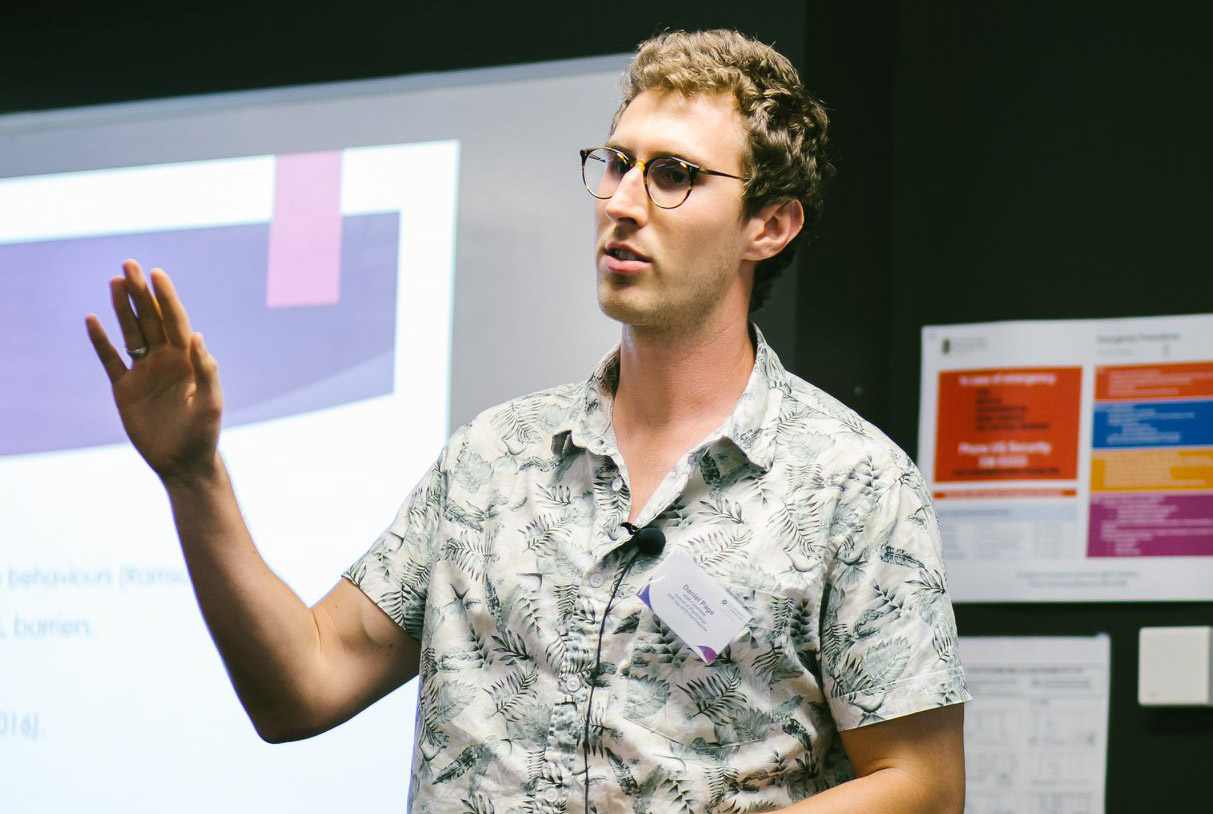Each month we shine the spotlight on a researcher within the Faculty of Health and Behavioural Sciences.

This month we caught up with Daniel Thomas Page, PhD scholar within the UQ School of Psychology.
What are your key research interests?
My research interests are broad and include Positive Youth Development, Public Health, and Disability. I enjoy using mixed research methodologies to implement and evaluate interventions. Developing and refining evidence-based programs and tools to better serve communities is exciting and rewarding work. The goal of my work is to improve lives by creating change that is meaningful, measurable, and makes a long-term impact.
My key research themes are:
- Intervention studies and action research
- Health psychology
- Positive psychology
What aspects do you enjoy most about your work?
Being a researcher, you are always learning and solving new problems. Collaborating with academics, industry, health care professionals, the NPO sector, and government enables the creation of exciting projects. There are amazing people in the world with great ideas and skills complementary to my own. Meeting new people and learning from them as we work together is both challenging and rewarding.
Working with youths is particularly gratifying, watching them grow and flourish. My research has led to the development of the Positive Youth Development Foundation (PYDF) as a means to fulfil my aspirations of bringing about change. As a director of the PYDF, a non-profit organisation in South Africa, I have the amazing opportunity to lead a team of dedicated individuals in realising our mutual desire to improve the lives of underserved youths.
What inspired you to pursue a career in academia?
During my time studying in South Africa I came to appreciate the value of research and how it can make a large positive impact on society. All countries benefit from evidence-based practice and policy. There is a need for researchers to engage with communities, conduct meaningful research, and communicate the scientific knowledge with those with the means to bring about significant change. Academia is the training ground for future change makers. Learning from everyone in my sphere allows me to stand on the shoulders of those who came before and contributed to the vast collective knowledge of science.
Regardless of discipline or specific research area, researchers are working towards making the world a better place.
What advice would you give to someone thinking about a research career?
As a PhD candidate, I am heavily biased towards promoting people towards being a researcher. There are countless avenues in which to progress and the skills and competencies you develop as a researcher are invaluable, no matter what you decide to do with your time and life.
My advice is to find a mentor, someone who you look up to (role model) and is interested in your growth and development. A mentor can help you navigate the pitfalls of academia and be an agent of support and promotion in your career.
Get used to setbacks, mistakes, and criticism. Academia and research can be frustrating, as failure and rejection are part and parcel of the process. Experiments, feedback, and the numerous applications are not always going to come back positively. There is no success without failure. Remember we are all human, try your best and enjoy your successes and don’t lament on the setbacks.
If you weren’t a researcher, what do you think you would be?
Given my interest in research and humanitarianism I imagine myself working for the World Health Organization or the United Nations. As the director of the PYDF I would devote myself to working in underserved communities in Africa.
Teaching is important to me, being the product of years of education I recognise its value. Teachers, mentors, and lecturers are all developing people and passing on their knowledge. It is one of life’s most meaningful endeavours.
Politics is also of interest to me as governments have the unique opportunity to bring about significant change. Being involved in some manner with government is always a possibility.
What are your interests outside of work?
Socialising with friends and family, physical activity, and the arts are of importance to me. Reading, film, and music are essential to my wellbeing. Exploring the natural world and all its delights is one of my greatest privileges and pleasures. Building the PYDF into a successful and respectable NPO that delivers evidence-based programming is rewarding and exciting.



